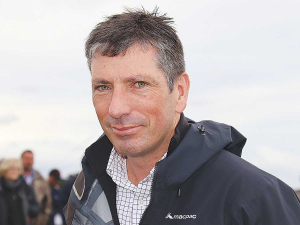MIA launches 2026 Red Meat Sector Dragon’s Den for innovative ideas
The Meat Industry Association (MIA) is once again looking for game-changing ideas for New Zealand's red meat processing and exporting sector.
 B+LNZ chief executive Sam McIvor says these barriers are real concerns that need to be prioritised as part of New Zealand’s trade strategy.
B+LNZ chief executive Sam McIvor says these barriers are real concerns that need to be prioritised as part of New Zealand’s trade strategy.
New Zealand must evolve its trade strategy to capture more value from existing markets if the country is to increase exports.
That’s according to the latest edition of the biennial Barriers to International Trade report, published by the Meat Industry Association of New Zealand (MIA) and Beef + Lamb New Zealand (B+LNZ), which shows that New Zealand’s free trade agreements have reduced the level of red meat tariffs from $366 million in 2010 to $193m in 2022.
Red meat farmers and producers generated almost $12b in export earnings in 2022. New Zealand’s second biggest goods exporter, the industry employs 92,000 people, or 5% of total national employment.
However, between 2021 and 2022 there was a 22% uptick in red meat tariffs due to New Zealand exporting more products to markets with high tariff rates.
MIA chief executive Sirma Karapeeva says that for decades New Zealand had been successful in securing FTAs in lucrative markets in Asia and further afield.
“But the world is changing and the international landscape is now marked by greater protectionism, geopolitical tensions and economic volatility in the wake of the pandemic,” she says.
“We need to ensure that our trade strategy is responsive to this changing environment and a central part of this is ensuring that we get the maximum value out of the FTAs we already have in place.”
Karapeeva adds that this work must also include a strong focus on non-tariff measures that apply beyond the border. The report shows that NZ’s red meat sector faces 117% more nontariff measures than the world average, adding $1.5 billion in yearly costs.
“Some of these nontariff measures work in our favour because of the quality of our products and systems such as food safety standards. But other technical barriers to trade impose $370 million in administrative costs that provide little consumer benefit.”
 |
|---|
|
Meat Industry Association chief executive Sirma Karapeeva says the international landscape is now marked by greater protectionism. |
B+LNZ chief executive Sam McIvor says these barriers are real concerns that need to be prioritised as part of New Zealand’s trade strategy.
“With on-farm inflation almost double general CPI (consumer price index) and average farm profits in the sheep and beef sector forecast to fall 30% this year, tackling tariff and non-tariff barriers requires government- to-government engagement,” he explains.
“That is why we are calling for it to top the trade priority list… the development of robust, science-based standards is a key strategy to tackling barriers to trade.”
McIvor adds that sustainability requirements are increasingly being placed on imports into key markets. He says while New Zealand’s farming practices are not the focus of these new regulations, beef and sheepmeat risks being unduly impacted by these barriers to trade. McIvor says ensuring that New Zealand farmers’ sustainability credentials are well understood by government officials in key markets is critical.
“New Zealand has invested significantly in establishing a framework of trade agreements and seen great success in tariff reductions. But as the economy starts facing headwinds, it is time to fully leverage all aspects of these agreements.”
Coming in at a year-end total at 3088 units, a rise of around 10% over the 2806 total for 2024, the signs are that the New Zealand farm machinery industry is turning the corner after a difficult couple of years.
New Zealand's animal health industry has a new tool addressing a long-standing sustainability issue.
The Government has announced that ACC will be a sponsor of this year's FMG Young Farmer of the Year competition.
As veterinary student numbers grow to help address New Zealand's national workforce shortge, Massey University's School of Veterinary Science is inviting more veterinary practices to partner in training the next generation of vets.
South Island dairy farmers will soon be able to supply organic milk to Fonterra.
Norwood has announced the opening of a new Tasman dealership at Richmond near Nelson next month.

OPINION: Meanwhile, red blooded Northland politician Matua Shane Jones has provided one of the most telling quotes of the year…
OPINION: This old mutt has been around for a few years now and it seems these ‘once in 100-year’ weather…